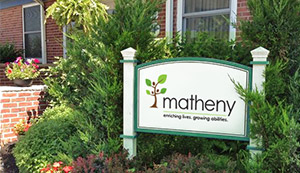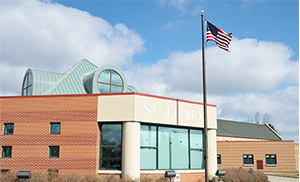Posted on December 16, 2014 by Matheny

Matheny School teacher Peggy Zappulla watches as a visitor to the Matheny booth tries out the adapted baseball pitch game.
Children accompanying their parents at the recent New Jersey Education Association (NJEA) convention in Atlantic City were introduced to the world of adapted sports when they visited the Matheny School exhibit. They were invited to participate in an adapted baseball pitch game, which would be part of a “pitching center” in a Matheny physical education class. Students could throw a ball or grasp and release a ball that was attached to a sklz trainer. The target was the mouth of a bulldog, which is the Matheny mascot.
In addition, a visual and/or physical impairment was added, according to Jim Hintenach, Matheny School supervisor of elementary education. “Some participants covered their eyes; others may have used only one hand or used their thumb, elbows or other body parts to propel the ball, just as our students do.” The idea was to help people understand that students with special needs and all people with disabilities are able to participate in various sports activities, with some adaptions.
The NJEA convention attracts thousands of educators throughout the state who are looking for high-quality professional development and the latest in educational technology.
Posted on April 25, 2014 by Matheny

Matheny director of physical therapy Cindy LaBar and Old Farmers student Carolina Booth help Matheny student Nicholas Barros Perez play the beanbag toss. LaBar, who grew up in and lives in Long Valley, attended Old Farmers Road.
“They do the same things we do. They just do them differently.” That comment by Old Farmers Road School fourth grader Tori Murray expressed perfectly the purpose of a recent visit by Matheny students to Old Farmers to demonstrate and compete in adapted sports.
The students participated in adapted bowling, a beanbag toss and manual wheelchair races. There was also a separate question-and-answer session with Sean Bielefeldt, Matheny director of recreation therapy. “The Matheny students like the same things you like,” explained Bielefeldt, “so remember that someone in a wheelchair is no different from you and me.”
The Old Farmers students learned how children with disabilities can participate in athletic activities by using adaptations. The visit also reduced any nervousness there may have been about how to relate to people with disabilities; and it replaced that nervousness with a sense of camaraderie and acceptance as the two groups competed together.

Old Farmers student Shannon Carratura competes in a wheelchair relay race.
Posted on April 4, 2014 by Matheny

T.J. Hanlon of Bernardsville, NJ, competed in a manual wheelchair race.
“I got to see how disabled people have fun just like us. They do the same things we do, just differently.” That comment by Grace Lurker of Peapack, NJ, a fourth grader at the Far Hills County Day School in Far Hills, NJ, pretty much summarized the reactions of her entire phys ed class to a recent visit by students and staff from Matheny.
The Matheny students demonstrated how they engage in adapted sports, and the FHCDS students tried their skills in such activities as wheelchair races and adapted bowling. The visit had several goals: to let the Far Hills students learn how children with disabilities can enjoy many of the same activities they do; to reduce anxiety about how to relate to people with disabilities; and to replace that anxiety with a sense of friendship and understanding as the two groups competed as peers.

Emily Samaro of Chester, NJ, tested her skill in adaptive bowling as Grace Lurker and Matheny teaching assistant Rita Della Valle looked on.
Posted on January 9, 2013 by Matheny

Robert Declan tries out a power wheelchair under the watchful eye of Matheny physical therapist Lisa Tuminelli.
The goal of the Matheny School’s adapted phys ed program is to make it possible for Matheny students to participate and compete in modified versions of as many sports as possible. The program ranges from races in both manual and power wheelchairs to adapted versions of bowling, soccer and basketball, to name a few.
For several years, Matheny has been taking this program on the road, to public and independent schools throughout New Jersey, introducing these adapted sports to students of all ages during their own physical education classes. The most recent trip was to a second grade gym class at the Central Elementary School in Great Meadows, NJ.
The visits have several objectives: to let able-bodied students know that children with disabilities enjoy many of the same activities they do; to break down barriers of anxiety about how to relate to people with disabilities; and to replace those barriers with a sense of camaraderie, understanding and friendship as the two groups of students compete as peers. By all accounts, the Central visit accomplished all of those goals.
Posted on April 12, 2012 by Matheny

FHCD student Cece Gulbrandsen plays adapted basketball.
“I thought this was awesome!” That’s how one fourth grader at the Far Hills Country Day School described the recent visit by Matheny students and staff to the phys ed class at the independent day school in Far Hills, NJ. The students played adapted basketball, rode in both manual and power wheelchairs and tried out special scooters.
It was part of a gym class that included seven students from Matheny along with therapists and teachers. The objective of the program is to encourage interaction between the two groups of students, enabling them to compete in sports as peers.
During a question-and-answer session following the class, the FHCDS students disagreed about which activity was most difficult. One student said, “The electric [power] wheelchair was hardest for me because I couldn’t figure out how to use the joystick.” But other students felt the adapted version of basketball was trickier.

FHCD students Ivan Scotto, left, and Peter Gajewski, right, with Matheny student Niara Holmes.











